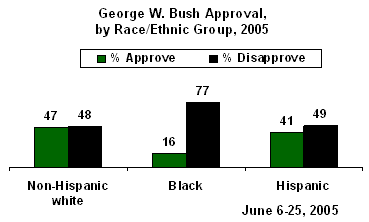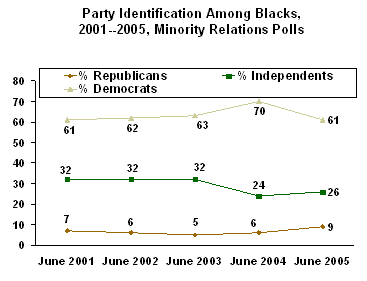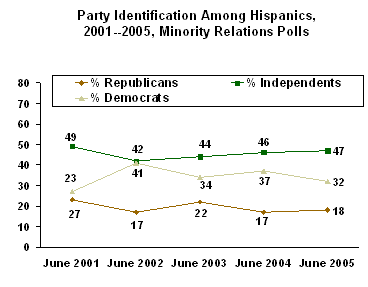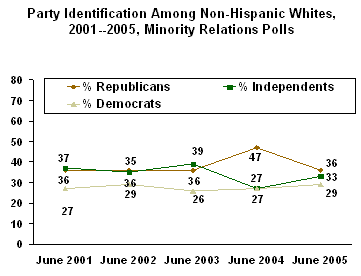GALLUP NEWS SERVICE
PRINCETON, NJ -- Republican Party leaders reached out to the black community last week with speeches by President Bush to a black group in Indiana and by party chairman Ken Mehlman to the NAACP convention in Milwaukee. The speeches were designed to convince blacks that minorities have made gains in home and small-business ownership during the Bush administration and to convince blacks that Republican policies on education, Social Security, and aid to religious charities would benefit them.
Results of the recent Gallup Minority Relations poll reveal that blacks continue to show very low levels of support for Bush and few identify politically as Republicans. In contrast, Hispanics are more likely to approve of Bush than are blacks, but on balance, Hispanics are more likely to disapprove than approve of him. Non-Hispanic whites continue to show higher levels of support for Bush and the Republican Party than do blacks or Hispanics, but are currently divided in their views of the job Bush is doing as president.
Bush Approval
In recent Gallup Polls, Bush's job approval ratings have ranked among the lowest of his presidency -- in the mid- to high-40% range, including a term-low 45% rating in late June. According to the June 6-25, 2005, Minority Relations poll, none of the major racial or ethnic groups in the United States show solid support for Bush. Most notably, blacks are highly unlikely to support Bush -- just 16% of blacks approve of him while 77% disapprove. Hispanics are more than twice as likely as blacks to approve of Bush (41%) and whites are nearly three times as likely (47%) to do so, but those groups are at least as likely to disapprove as to approve of Bush.

The data show essentially no change in blacks' and Hispanics' views of Bush compared with last year's poll. In June 2004, 16% of blacks and 40% of Hispanics approved of Bush. As a group, whites have shown a significant decline, from 61% to 47%. Thus, the slight decline in Bush support from around the 50% mark a year ago to the mid- to high-40s this year has come mostly among non-Hispanic whites.
An analysis of data from prior Minority Relations polls underscores the erosion in Bush's support over the past several years from its post-9/11 highs. The drop was dramatic for blacks and Hispanics between 2003 and 2004, when support for the Iraq war first started to decline, and has since leveled off. While whites showed some decline in their approval rating of Bush between 2003 and 2004, there has been a much larger decay in the last year.
|
Bush Job Approval by Racial and Ethnic Group, |
|||||
|
2001 |
2002 |
2003 |
2004 |
2005 |
|
|
% |
% |
% |
% |
% |
|
|
Non-Hispanic whites |
58 |
74 |
69 |
61 |
47 |
|
Blacks |
37 |
41 |
32 |
16 |
16 |
|
Hispanics |
59 |
73 |
67 |
40 |
41 |
Party Support
While Bush's approval ratings have fluctuated over the past several years, support for the Republican and Democratic parties by racial and ethnic groups has stayed fairly steady.
For example, the percentage of blacks identifying as Republicans has stayed in a narrow range of 5% to 9% in the last five years, while blacks' identification as Democrats has consistently exceeded 60%. Blacks have been about twice as likely (if not greater) to identify as Democrats as independents.

The current 9% Republican identification for blacks is slightly higher than what Gallup has measured in the Minority Relations polls to date, but it is not clear if that represents a real increase since the change is well within the margin of sampling error for the black sample.
In Gallup's final 2004 pre-election poll, Bush received 7% of the black vote -- while still miniscule it was an apparent improvement on his 3% support in 2000. However, given the small samples of blacks in those polls, it is not certain that Bush increased his vote share among blacks. The national exit poll, which has larger samples of blacks, suggested a slight increase in Bush's share of the black vote in 2004.
Both the Republicans and Democrats have made great efforts to appeal to Hispanics, who now represent the largest minority group in the United States. On the whole, Hispanics are more likely to identify as Republicans than are blacks, but more Hispanics align themselves with the Democratic Party (32%) than the Republican Party (18%). Notably, nearly half of Hispanics, 47%, do not affiliate with either party.

If anything, the data on party identification among whites shows the extent to which the Democratic Party has to rely on the minority vote to build winning electoral coalitions. Less than 30% of non-Hispanic whites have identified as Democrats in the Minority Relations polls, while Republican support has been around 36% (save for a perhaps aberrant reading of 47% in the June 2004 poll). Whites, like Hispanics, are also more likely to identify as independents than Democrats, although not quite to the degree that Hispanics do.

Party Support Varies by Age
A look inside the recent poll data among blacks reveals little difference in party identification due to gender or education level. However, younger blacks are much less likely than older blacks to support the Democratic Party.
Among blacks aged 50 and older, 73% identify as Democrats, 16% as independents, and only 6% as Republicans. But just over half of blacks aged 18 to 49 identify as Democrats (55%), with higher proportions identifying as independents (26%) and Republicans (11%). In prior years' polls, younger blacks were also less likely to identify as Democrats and more likely to identify as independents, but not necessarily more likely to identify as Republicans.
The difference in party support by age could be due to the politics of the civil rights struggles in the 1960s, something likely to be remembered well by older blacks. The Democratic Party strongly supported civil rights legislation but the Republican Party did not. In fact, during his speech to NAACP members, Mehlman apologized for the party's attitude toward blacks in the past.
The data also show that older Hispanics are more likely than younger Hispanics to identify with the Democratic Party, while younger Hispanics are quite likely to be independent. In the latest Minority Relations poll, 49% of Hispanics aged 50 and older identify as Democrats, while 21% are Republicans, and 25% independent. In contrast, a plurality of Hispanics aged 18 to 49 are independent (52%), while 28% are Democrat and 18% Republican.
Generally speaking, younger Americans of all backgrounds are more likely to be independent than are older people, but as people age they generally align themselves with one or the other party. The data suggest young Hispanics are especially likely to be up-for-grabs when it comes to party loyalty, and the parties will surely struggle to gain a foothold on Hispanic political loyalties. While black loyalties are firmly in line with the Democrats, a significant proportion of younger blacks have yet to come into the Democratic fold.
Survey Methods
These results are based on telephone interviews with a randomly selected national sample of 2,264 national adults, including oversamples of blacks and Hispanics, aged 18 and older, conducted June 6-25, 2005. For results based on the total sample, one can say with 95% confidence that the maximum margin of sampling error is ±5 percentage points.
Results for the sample of 807 non-Hispanic whites, aged 18 and older, are based on telephone interviews conducted June 6-25, 2005. For results based on the total sample, one can say with 95% confidence that the maximum margin of sampling error is ±7 percentage points.
Results for the sample of 802 blacks, aged 18 and older, are based on telephone interviews conducted June 6-25, 2005. For results based on the total sample, one can say with 95% confidence that the maximum margin of sampling error is ±5 percentage points.
Results for the sample of 511 Hispanics, aged 18 and older, are based on telephone interviews, conducted June 6-25, 2005. For results based on the total sample, one can say with 95% confidence that the maximum margin of sampling error is ±5 percentage points. (181 out of the 511 interviews with Hispanics were conducted in Spanish).
In addition to sampling error, question wording and practical difficulties in conducting surveys can introduce error or bias into the findings of public opinion polls.
1. Do you approve or disapprove of the way George W. Bush is handling his job as president?
|
Approve |
Disapprove |
No opinion |
|
|
% |
% |
% |
|
|
Non-Hispanic Whites |
|
|
|
|
2005 Jun 6-25 |
47 |
48 |
5 |
|
2004 Jun 9-30 |
61 |
38 |
1 |
|
2003 Jun 12-15 |
69 |
28 |
3 |
|
2002 Jun 3-6 |
74 |
20 |
6 |
|
2001 Jun 11-17 |
58 |
31 |
11 |
|
|
|
|
|
|
Blacks |
|
|
|
|
2005 Jun 6-25 |
16 |
77 |
7 |
|
2004 Jun 9-30 |
16 |
79 |
5 |
|
2003 Jun 12-18 |
32 |
57 |
11 |
|
2002 Jun 3-9 |
41 |
48 |
11 |
|
2001 Jun 11-17 |
37 |
50 |
13 |
|
|
|
|
|
|
Hispanics |
|
|
|
|
2005 Jun 6-25 |
41 |
49 |
10 |
|
2004 Jun 9-30 |
40 |
52 |
8 |
|
2003 Jun 12-18 |
67 |
25 |
8 |
|
2002 Oct 3-8 |
61 |
30 |
9 |
|
2002 Jun 3-9 |
73 |
19 |
8 |
|
2001 Jun 11-17 |
59 |
28 |
13 |
2. In general, are you satisfied or dissatisfied with the way things are going in the United States at this time?
|
Satisfied |
Dissatisfied |
No opinion |
|
|
% |
% |
% |
|
|
Non-Hispanic Whites |
|
|
|
|
2005 Jun 6-25 |
39 |
58 |
3 |
|
2004 Jun 9-30 |
51 |
47 |
2 |
|
2003 Jun 12-15 |
52 |
47 |
1 |
|
2002 Jun 3-6 |
57 |
40 |
3 |
|
2001 Jun 11-17 |
54 |
43 |
3 |
|
|
|
|
|
|
Blacks |
|
|
|
|
2005 Jun 6-25 |
17 |
80 |
3 |
|
2004 Jun 9-30 |
15 |
83 |
2 |
|
2003 Jun 12-18 |
23 |
74 |
3 |
|
2002 Jun 3-9 |
28 |
67 |
5 |
|
2001 Jun 11-17 |
37 |
60 |
3 |
|
|
|
|
|
|
Hispanics |
|
|
|
|
2005 Jun 6-25 |
37 |
59 |
4 |
|
2004 Jun 9-30 |
35 |
60 |
5 |
|
2003 Jun 12-18 |
51 |
46 |
3 |
|
2002 Oct 3-8 |
49 |
48 |
3 |
|
2002 Jun 3-9 |
54 |
43 |
3 |
|
2001 Jun 11-17 |
53 |
44 |
3 |
D9. In politics, as of today, do you consider yourself a Republican, a Democrat, or an Independent?
|
Republican |
Independent |
Democrat |
|
|
% |
% |
% |
|
|
Non-Hispanic Whites |
|
|
|
|
2005 Jun 6-25 |
36 |
33 |
29 |
|
2004 Jun 9-30 |
47 |
27 |
27 |
|
2003 Jun 12-15 |
36 |
39 |
26 |
|
2002 Jun 3-6 |
36 |
35 |
29 |
|
2001 Jun 11-17 |
36 |
37 |
27 |
|
|
|
|
|
|
Blacks |
|
|
|
|
2005 Jun 6-25 |
9 |
26 |
61 |
|
2004 Jun 9-30 |
6 |
24 |
70 |
|
2003 Jun 12-18 |
5 |
32 |
63 |
|
2002 Jun 3-9 |
6 |
32 |
62 |
|
2001 Jun 11-17 |
7 |
32 |
61 |
|
|
|
|
|
|
Hispanics |
|
|
|
|
2005 Jun 6-25 |
18 |
47 |
32 |
|
2004 Jun 9-30 |
17 |
46 |
37 |
|
2003 Jun 12-18 |
22 |
44 |
34 |
|
2002 Jun 3-9 |
17 |
42 |
41 |
|
2001 Jun 11-17 |
23 |
49 |
27 |
D9. In politics, as of today, do you consider yourself a Republican, a Democrat, or an Independent?
D9a. As of today, do you lean more to the Democratic Party or the Republican Party?
"LEANED" PARTY IDENTIFICATION (COMBINED RESPONSES D9/D9A)
|
Republican + |
Independent |
Democrat + |
|
|
% |
% |
% |
|
|
Non-Hispanic Whites |
|
|
|
|
2005 Jun 6-25 |
43 |
12 |
45 |
|
2004 Jun 9-30 |
56 |
7 |
37 |
|
2003 Jun 12-15 |
51 |
9 |
40 |
|
2002 Jun 3-6 |
49 |
9 |
42 |
|
2001 Jun 11-17 |
47 |
11 |
42 |
|
|
|
|
|
|
Blacks |
|
|
|
|
2005 Jun 6-25 |
14 |
12 |
74 |
|
2004 Jun 9-30 |
12 |
7 |
82 |
|
2003 Jun 12-18 |
10 |
9 |
81 |
|
2002 Jun 3-9 |
11 |
14 |
75 |
|
2001 Jun 11-17 |
12 |
11 |
77 |
|
|
|
|
|
|
Hispanics |
|
|
|
|
2005 Jun 6-25 |
30 |
20 |
49 |
|
2004 Jun 9-30 |
35 |
10 |
56 |
|
2003 Jun 12-18 |
35 |
13 |
52 |
|
2002 Jun 3-9 |
27 |
19 |
54 |
|
2001 Jun 11-17 |
35 |
23 |
42 |
